 Leading Blog | Posts by Category |
 Leading Blog | Posts by Category |
02.23.18

Blowing Past Our Limits
W We do not come to our potential without struggle. Most of life is not under our control, but that’s where our opportunity lies. Courage can push us beyond our imagined limits. Courage leads to the persistence required to practice consistently to a desired end. The most common fear leader's face is the fear of failure. You will face moments when you want to back down because everything inside of you says, “Don’t take the risk.” It is in those moments that your decision to hold back or jump will determine the defining moments of your life. When we look back over our lives, the extraordinary moments, the turning points in our lives required pushing through the fear. Our potential is just beyond our fear. Courage requires clarity, energy, direction, and action. Courage means taking the first step into the unknown that begins the process to a positive, desired end. When we demonstrate courage, we open the doors to other virtues like humility, kindness, patience, and persistence. All require courage. Courage is contagious. Billy Graham said, “When a brave man takes a stand, the spines of others are stiffened.” If we, as Street said, have the courage to blow past our own limits and step into a new place, we will encourage others to do the same. People feel our courage and will, in time model courage in their own lives. We owe it to those we lead to face uncertainty and the accompanying risks and blow past them. What courageous action should you take today? This post is adapted from the LeadershipNow newsletter: Lead:ology February 2018. Take a moment to add yourself to the e-mail list.
Posted by Michael McKinney at 08:18 AM
02.11.11

Taking Another Look: Leading Minds on Reflection Part 4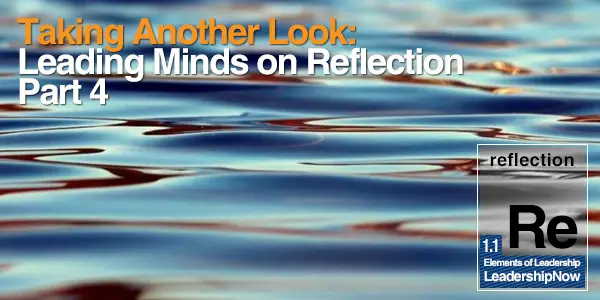
In the final part of this series, Marshall Goldsmith explains the relevancy of reflection in today’s world. It has always been a vital ingredient to success, but it becomes critical in the age of the knowledge worker. Jeremy Hunter teaches courses on The Practice of Self-Management at The Peter F. Drucker and Masatoshi Ito Graduate School of Management. He emphasizes a focus on reflecting in real-time—in the present—in order to align both our intentions and behaviors so that we might bring about the results we seek.
I believe that the process of reflection is more important today than ever before. I also believe that it is more challenging. We live in the age of the knowledge worker. Peter Drucker defined knowledge workers as 'people who know more about what they are doing than their boss'. Knowledge workers need to think and reflect. They have to listen and learn. They cannot just 'do what they are told', since their managers know less than they do about what they are doing. On the other hand, we live in a world of constant stimulus. Our minds are barraged by media of all forms. Cell phones, emails, text messages, and personal computers have reduced our already-limited attention spans. One of the great challenges for the knowledge worker of the future is finding the time to think - in a world that is screaming at you to act.
When we think of “reflection” it tends to be retrospective. Where I think my work is a bit different is that I focus on what a leader is doing right now as it is happening––reflection and awareness in the moment. Most people's immediate action will very likely be an automatic non-conscious process that they're not aware of. Throw in a little stress and emotional reactivity and people find themselves doing and saying things that are destructive to themselves, others, and their goals without understanding why nor knowing what to do about it. The big issue is that the retrospective analysis alone can’t necessarily change a person's immediate habits. Science tells us that 90% or more of the brain’s activity is automatic and non-conscious. However, we have a worldview that focuses largely on conscious processing, we think that having the answer makes change automatically happen. A friend might say, “You know, Ruth, when you’re confronted with a challenge from a superior, you react too strongly.” OK, now Ruth knows that. We assume that just because Ruth knows what she does, she will change it. But there’s a whole other process that has to happen to change the wired-in, non-conscious, automatic pattern. Ruth may be 100% aware of what she does but then the trigger happens and it plays out in the same way. And then it’s, “Oh no, I did it again.” Change happens in the choices we make right now. So my interest is in, how you actually retrain the brain by interrupting that automatic habit and doing something differently. You may have to do it over and over again but at some point, the rewiring function will happen. And that’s a function of interrupting that immediate non-conscious habit and doing something different. I give people a model of this process from the triggering moment of contact to the final result. All along there are intervention points. Of course, the earlier you can intervene, the better. Not everyone can interrupt the process early on, but what I emphasize is that you just need to interrupt it somewhere. And the more practiced one gets at it, the earlier you can see what is happening. It’s really about becoming more conscious about what you are doing, why you are doing it, what result do you want and do these behaviors get you there, and if they don’t, what do you need to be doing instead? You always start with the repeated unwanted result. What’s the thing that keeps happening that you don’t want? For example, Ruth might say, “I notice that whenever I’m confronted, I fight back too aggressively or I get too hostile.” So now she knows that about herself and that’s the reflective piece. Now, let’s tie that reflection to action. The next step is to build awareness of when and how that habit plays out. For example, “I have this meeting with my boss and I know he’s upset about something. What is it I do that might push back too hard, that gets me in trouble?" And so in that moment, she's bringing attention to all the things that happen automatically--what is she doing? What is she feeling in the body? Tension? Pressure? What emotions are arising? What are the stories in her head? Directing her attention to her internal experience creates the awareness of the non-conscious habit. She now has the opportunity to step outside all those automatic reactions and make a different, more conscious choice. We’re tying the process of reflection to immediate behavior. Again, change happens in the choices we make right now. As people are increasingly “burned out” from the stress and uncertainty of the economic reset, it’s too simplistic to just return to basic vacation policies, doing little to introduce meaningful distinctions between home and work. When the workday rarely ends, given technology’s ability to engage employees any time and anywhere, sabbaticals offer a refreshing moment to simply pause. Sabbaticals lead to people stepping back to see their work and creativity through a different lens. —Daniel Patrick Forrester, Consider
More in this Series:
Posted by Michael McKinney at 11:14 AM
02.10.11

Taking Another Look: Leading Minds on Reflection Part 3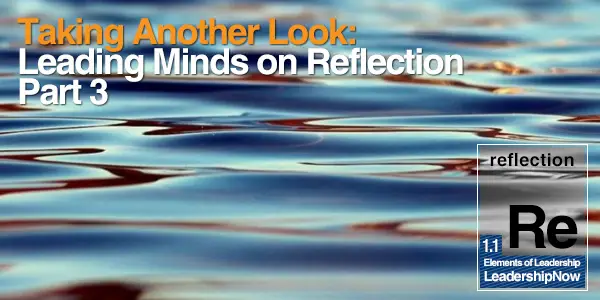
In part three of this series, James Strock talks about the importance of taking time “off” from one’s customary activities. He also gives insight into gaining perspective through reflection. Mark Sanborn talks about the essential nature of making time to think so that we might learn and gain insight from our experiences. He lists some areas we should be thinking about so that we might get the most out of our time reflecting.
There is nothing more important—or more easily overlooked—than making time for disciplined reflection. Indeed, it should be scheduled—and protected and enforced—with the utmost seriousness. Religious traditions include notions of a Sabbath, a day of rest and reflection. It’s a recognition that taking time “off” from one’s customary activities is necessary to fulfill one’s obligations, to perform effectively over time. It’s also an act of humility, pulling people away from a prideful presumption of the significance of their personal contribution and control when it tends toward isolating, habitual overwork. It’s surely not a coincidence that so many of the greatest leaders have been noted for multiple interests. Winston Churchill was active as a painter, speaker, historian, and commentator on current events. Theodore Roosevelt was, in the memorable description of Brander Matthews, “polygonal.” George Washington and Abraham Lincoln maintained perspective through theatre. Though it would be an error to say that effective leaders have “balanced” lives at any given moment, they tend to bring a number of interests to bear—thereby increasing their capacity to see things from various perspectives and to discern and appreciate the contributions of others. In business, one thinks of Bill Gates’ semi-annual, week-long sabbaticals for study and reflection. Many enterprises—from Google and GE to sports teams—encourage regular meditation or related mental exercises. To the extent each day can be seen as a sort of lifetime in itself, meditation or prayer can also be viewed as a sabbatical of sorts. In my personal experience, travel can be invaluable. Simply being pulled out of one’s daily routines and habits, and being inspired by new surroundings, can be mentally and spiritually invigorating. You may see familiar notions with new eyes. Though disciplined reflection has always been important for leadership, it’s arguably more important now than ever before. In the 21st century, information and data are often ubiquitous. The value added by leaders—either in high positions or not—increasingly arises from those invaluable intangibles: judgment and insight. Both of those are more likely to be found with disciplined reflection. And there’s no better place to start than from history and the observations and experiences of others, such as is offered so notably by LeadershipNow.
Someone once said if we don't slow down occasionally nothing good can ever catch us. I think that sentiment applies to the good that can come out of reflection. One of the reasons we don't learn—truly internalize lessons—and keep making similar mistakes is that we don't pause long enough to gain any insights. Most of the busy and successful professionals I work with—and myself included—can go for long periods of time without actively thinking. We reactively think—response to questions, problems, opportunities, etc.—but don't make time to proactively think. I frequently say that nobody has time for anything; we make time for what is important. So often we live life by default and let circumstance and the demands of others determine how we spend our time. I believe we need to make time for reflection. We make time when we priorities, eliminate and adjust our schedules. Specifically, I think leaders should reflect on:
Reflection usually requires "getting away" whether that requires a physical relocation to a peaceful thinking spot or simply blocking time to avoid interruptions.
There is a hierarchy of communication we all practice, in which electronic and immediate data responses reign far above in-person and more time-intensive, dialogue-driven interaction. The trade-off is easy to make: we gain speed, immediate connection, and reactions while giving up richer contexts that emerge only when we take time to think. There are times when the arrival of each new electronic message or data-driven distraction has become a digital proxy for the sound of a bell once used by a doctor named Pavlov. —Daniel Patrick Forrester, Consider
More in this Series:
Posted by Michael McKinney at 10:58 AM
02.09.11

Taking Another Look: Leading Minds on Reflection Part 2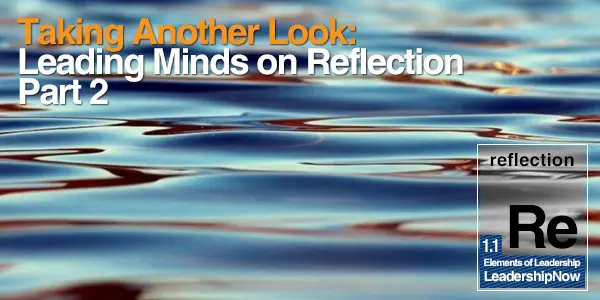
In part two of this series, Tom Asacker philosophizes about the nature of reflection. His insights help us to understand that until we start to see our connection to reality, core changes rarely happen. Have we given the proper consideration to the impact of what we do? Then, Brian Orchard emphasizes the need to slow down enough to absorb what we are experiencing. He talks about the need to take a second look to gain understanding and the importance of getting counsel in decision making.
I’ve noticed something interesting of late. I’ve been spending more time reflecting on my work than passionately involved in the doing of it. To an outsider, it may look like idleness. In fact, history informs me that it’s a necessary prelude to meaningful change, to boldness and growth. Our work should be designed to move us forward, toward a worthy ideal, meaning, and a better life. But in order to get there, we must occasionally pause from its narcotic effect and critically evaluate its impact on our happiness and well-being, and its resulting influence on our community and environment. We must sit quietly and reflect. Reflection is not daydreaming. Reflection is imaginative inquiry; it’s an internal dialogue that asks, Am I making a difference? Is this the best that I can do? Will people be advanced by my efforts? Will my children be proud of my actions? Yes, there is boldness in action. But we must follow action with quiet reflection for that boldness to remain relevant and vibrant. Elbert Hubbard wrote, “The reason men oppose progress is not that they hate progress, but that they love inertia.” Reflection is the path to progress. Imaginative reflection breaks the powerful grasp of inertia—the desire to stay the course regardless of the impact on our lives—and moves us courageously towards our higher potential.
This quote from the Guardian summarizes for me, where we are at: “Although, because of the Internet, we have become very good at collecting a wide range of factual tidbits, we are also gradually forgetting how to sit back, contemplate, and relate all these facts to each other.” And so, as Carr writes, "we're losing our ability to strike a balance between those two very different states of mind. Mentally, we're in perpetual locomotion." From my experience as a minister, I have found that an issue is rarely understood well by the first exposure to it. Our first response is usually weighted by whoever presented the issue. It takes time and thought to slowly come to a more complete understanding. The value of reflection in this case allows for a deeper understanding to be obtained by thinking about the issue and allowing it to be seen from a number of angles. There are two biblical principles that to me, support reflection. First, Proverbs 18:17 states, “The one who states his case first seems right, until the other comes and examines him.” We all have the tendency to accept the first version of what we hear, but the concept of “searching” carries the idea of talking and asking questions, but also thinking about the situation and the reconsidering of fundamental assumptions. The second is simply the whole idea of seeking counsel. This must mean a certain amount of reflection and counsel has a strong bearing on decision making. Devaluing reflection while expecting constant growth and innovation is nonsensical. It’s only when we step away from the onslaught of the day that a new direction arises (good or bad). By never stepping away and, instead, insisting on constant connectivity, you can’t be sure if what you are working on will prove you to be relevant in the future. —Daniel Patrick Forrester, Consider
More in this Series:
Posted by Michael McKinney at 10:43 AM
02.08.11

Taking Another Look: Leading Minds on Reflection Part 1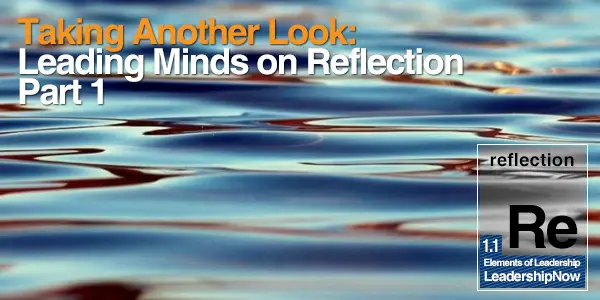
John Kotter begins this series on reflection by talking about the need to develop a reflective habit and why we don’t. Are we spending our time on the right issues? Are we delegating issues we should not be working on that could be better dealt with more locally in the organization? Kotter also stresses its importance as a continual learning tool. John Baldoni urges us to make the time to reflect to gain perspective. He reframes reflection as an action step, not a passive process.
In a world that is moving faster and faster, and changing more and in larger leaps, learning becomes a gigantic issue. Doing what you know is not enough. And learning cannot come in a classroom once every 2 years. That’s too little too late. Learning has to be an ongoing process, literally all the time. People learn in many ways. Reading really good books can help. Talking to really good people can help. Nothing wrong with going to a Harvard executive education program, but there is no better teacher than reflection on the world, and especially one’s own actions. I did X. It produced Z. But is Z what we really need? And why did X create Z? And what were the other alternatives? And can I find others (in books, discussions, HBS) that tried those other alternatives? Obviously, self awareness makes this easier. If I pay no attention to what I am really doing, what it is really producing, it’s hard to reflect on that. One can be both action oriented and reflective. Action oriented means when you know what to do and you do it. Now. Not next quarter. Let’s go. Reflection means using the time on airplanes, when you’re not on the slopes or with family at the ski lodge, Zenning-out on the beach—whatever—to think. People don’t reflect because they have no time, but usually because they don’t delegate enough, let others delegate up to them, or don’t have the staff they can delegate to—all correctable problems. People don’t reflect because they haven’t—so they have no reflective habit, so to speak. Correctable too. Since the end game is life, not one’s job, all this is not only applicable to life in general but is arguably more important for life in general. And since leaders have the capacity to help or hurt us all a great deal, everything I have said here is very important in their case.
Reflection is a powerful tool for leaders, and one that is much underused. The chief reason is perceived lack of time. I remember asking the late Skip LeFauvre, the man who ran Saturn, how he found time for it. He said, "Put it on your schedule." Reflection is a means of gaining perspective. It challenges you to think where you are now and where you might want to go. How to get there is a good thing to consider during reflection.
Constant change doesn’t lend itself to instantaneous insights through simple phrases like “too big to fail,” and “liquidity crisis.” The question we must ask ourselves is this: In the midst of dramatic and extreme change, has decision making devolved into merely informed chaos, or can we imbed reflection and think time into our habits and routines to arrive at better outcomes and understanding? —Daniel Patrick Forrester, Consider
More in this Series:
Posted by Michael McKinney at 01:47 PM
|
BUILD YOUR KNOWLEDGE
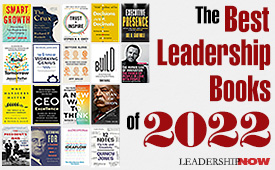

How to Do Your Start-Up Right STRAIGHT TALK FOR START-UPS 
Grow Your Leadership Skills NEW AND UPCOMING LEADERSHIP BOOKS 
Leadership Minute BITE-SIZE CONCEPTS YOU CAN CHEW ON 
Classic Leadership Books BOOKS TO READ BEFORE YOU LEAD |
|